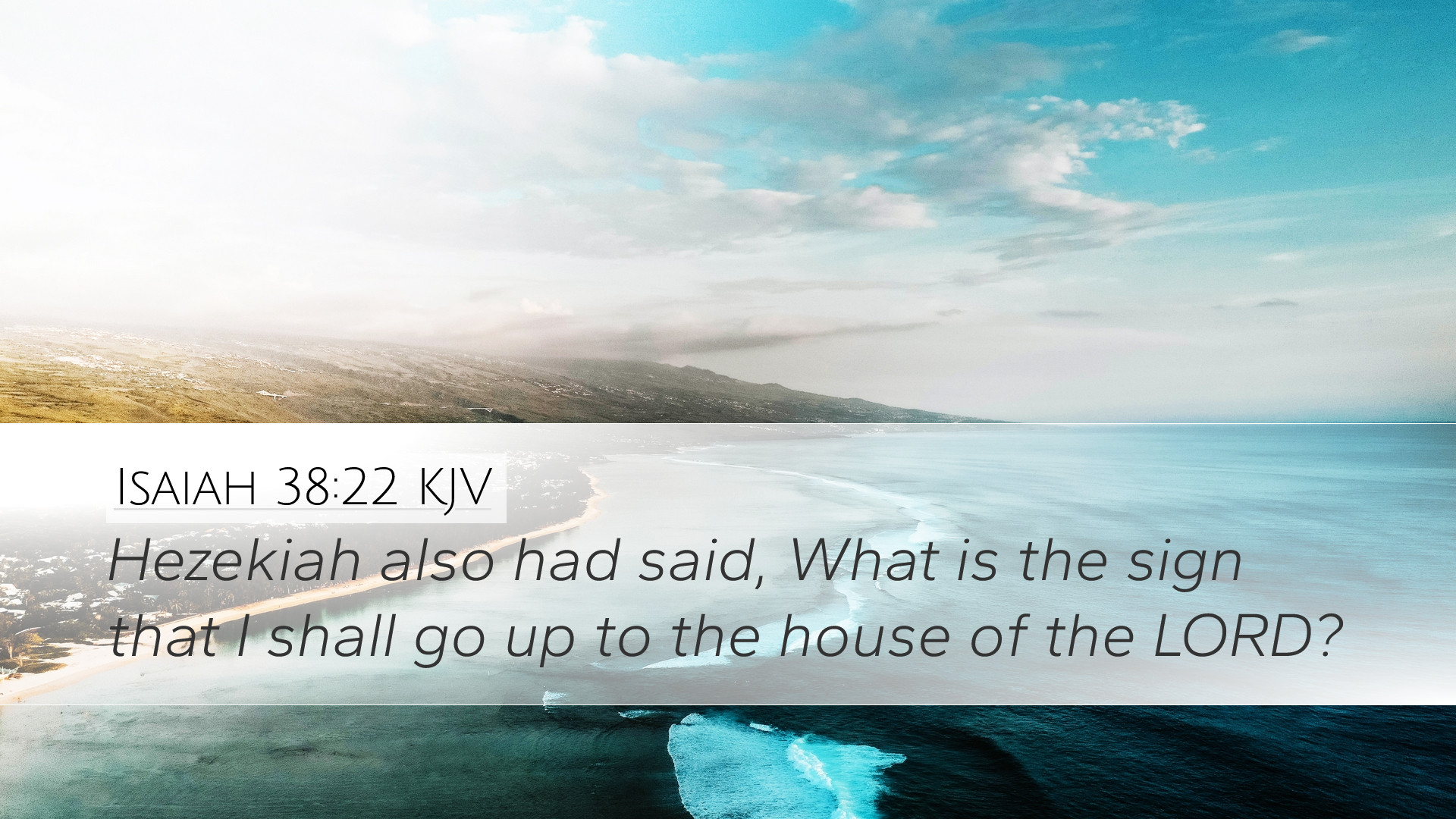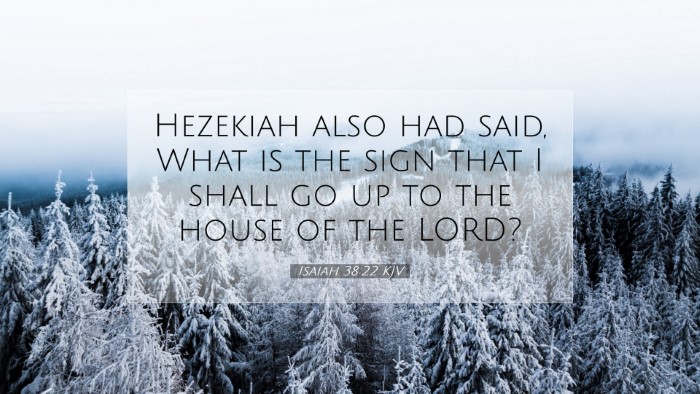Commentary on Isaiah 38:22
Verse Text: "Hezekiah also had said, What is the sign that I shall go up to the house of the LORD?" (Isaiah 38:22, KJV)
Contextual Overview
Isaiah 38 recounts the dramatic illness of King Hezekiah and his subsequent prayer to God for healing. This chapter reveals not only God's compassion but also the importance of signs as affirmations of divine promises. Hezekiah's inquiry about the sign he would receive before ascending to the temple underscores a profound desire for confirmation of God's word.
Matthew Henry's Insights
Matthew Henry interprets this verse as indicative of Hezekiah's faith; he seeks assurance that his healing is genuine and not merely a fleeting relief. The act of ascending to the house of the Lord represents Hezekiah's intention to return to worship and service after his recovery, emphasizing the connection between healing and spiritual renewal. Henry notes the significance of signs in Scripture, recognizing that divine manifestations are often meant to bolster faith.
-
Theological Implications: The healing of Hezekiah serves as an example of God's mercy toward those who earnestly seek Him. Henry posits that believers are encouraged to seek confirmation of God's work in their lives, which He often graciously provides.
-
The Role of Worship: Hezekiah's desire to return to the temple reflects his understanding that worship is integral to a restored relationship with God. The believer's return to communal worship may be seen as an essential response to divine favor.
Albert Barnes' Commentary
Albert Barnes highlights the significance of Hezekiah’s question about the sign as indicative of his need for encouragement in light of his grievous illness. Barnes considers the nature of signs in the biblical narrative, suggesting they are often physical manifestations that serve to solidify faith. Here, Hezekiah is portrayed as one who understands the weight of divine promises and seeks tangible assurance of God’s word.
-
Understanding Signs: Barnes elucidates that Hezekiah’s inquiry is not merely about personal reassurance but also involves the broader implications of God’s covenant with His people. Signs such as healing or deliverance reflect God's faithfulness.
-
The Ascension to Worship: Barnes emphasizes the critical role of returning to worship as a response to God’s merciful acts. Hezekiah's desire to ascend to God’s house speaks to the heart of worship as a response to divine intervention—a key aspect of Israel’s covenant relationship with God.
Adam Clarke's Perspective
Adam Clarke provides a thorough exegesis of the verse, focusing on the implications of Hezekiah's question regarding the sign. He interprets this moment as one of deep spiritual introspection, where Hezekiah not only seeks physical healing but desires confirmation that his life remains in alignment with God's plan. Clarke highlights that the request for a sign demonstrates Hezekiah's understanding of the need for faith in action—faith that anticipates and responds to divine truth.
-
Significance of Faith: Clarke suggests that Hezekiah's approach is instructive for believers today, illustrating that faith should be proactive—asking God for assurance and understanding during challenging times.
-
The House of the LORD: Hezekiah’s yearning to return to the temple signifies not just a physical location but a spiritual state of being. Clarke posits that true worship is holistic, encompassing recognition of God’s power, mercy, and the believer’s commitment to uphold His covenant.
Theological and Practical Applications
Isaiah 38:22 invites several reflections pertinent to pastors, students, theologians, and scholars seeking to understand the depth of faith demonstrated by Hezekiah. The inquiries about signs and the desire to worship reinforce that faith is often accompanied by the need for assurance and affirmation from God. The following applications emerge:
-
Encouragement in Trials: Hezekiah’s earnest plea can serve as a model for believers facing trials. God responds to heartfelt prayers and requests for reassurance, reflecting His ongoing relationship with His faithful.
-
The Importance of Community Worship: The ascent to the house of the Lord highlights the centrality of worship in the life of believers. The act of gathering in worship not only affirms individual faith but strengthens the body of Christ collectively.
-
Understanding Divine Significance: Believers today should actively seek to discern God’s signs in their lives, recognizing that His responses may not always be direct but often come through His Word and community.
-
Covenant Relationship: The chapter reveals the intimate connection between God and His people. An understanding of this covenant can enhance the believer's life, guiding actions and faith responses amidst uncertainty.
Conclusion
In conclusion, Isaiah 38:22 serves as a poignant reminder of the intersection between faith, healing, and worship. Through the inquiries of King Hezekiah, significant themes of divine assurance, covenant, and communal worship emerge. The insights of notable commentators like Matthew Henry, Albert Barnes, and Adam Clarke provide a rich tapestry of understanding that encourages deeper reflection on the nature of one's relationship with God in times of uncertainty.


